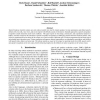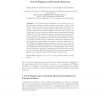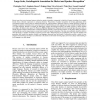255 search results - page 24 / 51 » On the use of speaker superfactors for speaker recognition |
LREC
2010
13 years 8 months ago
2010
Typical broadcast material contains not only studio-recorded texts read by trained speakers, but also spontaneous and dialect speech, debates with cross-talk, voice-overs, and on-...
EFORENSICS
2009
Springer
14 years 2 months ago
2009
Springer
Abstract. This article describes techniques of vocal forgery able to affect automatic speaker recognition system in a forensic context. Vocal forgery covers two main aspects: voice...
LREC
2008
13 years 8 months ago
2008
Recent years have seen increased interest within the speaker recognition community in high-level features including, for example, lexical choice, idiomatic expressions or syntacti...
ICASSP
2008
IEEE
14 years 1 months ago
2008
IEEE
This paper describes an algorithm that performs a simple form of computational auditory scene analysis to separate multiple speech signals from one another on the basis of the mod...
NIPS
2001
13 years 8 months ago
2001
A novel approach for comparing sequences of observations using an explicit-expansion kernel is demonstrated. The kernel is derived using the assumption of the independence of the ...



